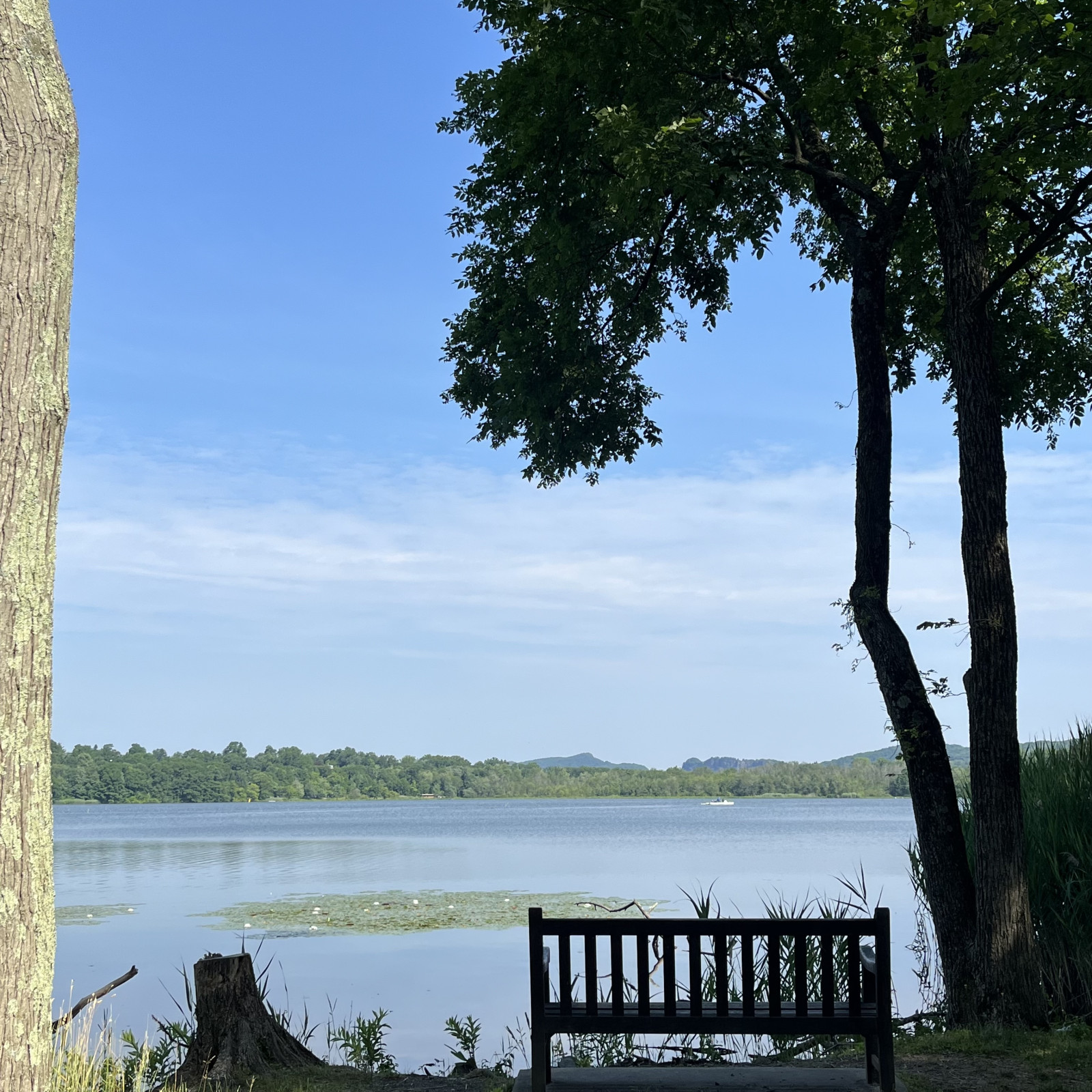
I am well aware of what happens while we wait. The hope that keeps us going, until it begins to feel like it is crushing us. The effort we make that seems to go nowhere. The prayers we pray. The angst that feels like it is crushing our lungs. The constant wondering if it will ever happen, knowing that just because it hasn’t happened doesn’t mean it won’t, but it doesn’t mean it will. Carrying this unseen weight into all moments, desperately wanting answers, while knowing that only God holds them.
As a coach this is where I would investigate what is holding you back, all the while knowing that sometimes we just need the grace of time. Grace means unmerited favor, so to be favored with time is an amazing gift, but it doesn’t feel amazing in the wait. In the moment it can feel hopeless, helpless, never ending, crazy, aching, longing, searching, or even an extended dark night of the soul. This is where I find the gift of perspective. It may have been YEARS of waiting, working, quips/proverbs/quotes, and wondering when you will see the results. So more time does not feel like a gift, but you are exactly where you need to be, which means if you need time you need it for a reason … or a few reasons.
In my experience that isn’t exactly comforting. But you aren’t comfortable right now, you are in the season of YET. Part of the discomfort is discovering how little of life is comfortable. Humans do everything we can to get and keep comfortable, we tolerate horrible situations because the known is just comfortable enough, and the unknown is terrifying. For those of us who have stepped into the land of YET, we have discovered value in the discomfort. There are a lot more feelings than just comfort. Comfort can bring laziness, indifference, and an unhealthy tolerance. It is in having the strength, patience, and bravery to sit in the uncomfortable YET, waiting for things to finally work out, that we discover life has far more for us than comfort and happiness.
Here you are in the uncomfortable yet. Discovering that there is more to life. More to you. More to be. Are you white knuckling it? Or are you taking this time to grow, heal, and become the person who is ready to step out of the yet and into the finally? As a coach this is what I do, I help people find perspective and growth in the waiting. I help people overcome that which keeps them stuck. And I can help you too! Click here to sign up for a free 30min sample session to discover how.

Grief is one of those deeply personal experiences because no one has your exact life story. Which means when the grief hits you are acutely aware of how alone you can be in life. As we enter Memorial Day weekend it is super easy to focus on all the summery activities and obligations. Graduations are happening, along with their celebrations. The warmth of the season pulls us back out into nature. And we forget that this holiday was set after World War 2 to remember those that died serving our country in war.
My Grandfather served in Korea, one of the core memories that I have is of him standing in his kitchen staring out the window, while smoking a cigar and sipping coffee. He wouldn’t talk about what was on his mind, men of his generation didn’t do that. But it was on his face, the ache of the losses he had faced throughout his life. Losses that extended beyond losing friends in war, his parents, siblings, and even a daughter. For the weight of grief is also in the losses we don’t acknowledge as a culture or community.
When someone dies we gather as a community to celebrate their life, and to grieve together. When a beloved pet passes those who are closest to us come around us to help us grieve the loss and adjust to the void. When we lose a job someone may observe that we need to grieve it, but mostly we are told to learn from it and move on. I have found that in all that we grieve the common thread is grieving what will never be. My Grandfather ached for the men with whom he would not be able to talk to again. We ache for the pet that no longer greets us. We ache for the lost opportunities that come with losing a job. We ache for our children who don’t have the opportunities we hoped for them. We ache for the relationships we haven’t been able to keep. We grieve the loss of our dreams, all we hoped for that will never be. We grieve.
What makes it good? Grief can be such a delicately complicated web. Only the one who weaves it knows which are the sticky threads. One of those sticky threads is the painful reality that in losing a good thing, we also lose some bad. There seems to be an unspoken rule when someone dies that we aren’t allowed to speak poorly of them, even if it is true. When we lose a job we want to speak poorly of those that did the firing, but what about the parts of the job that you won’t miss? When you lose a friendship, what about that person leaving your life is healing to you?
I have learned that the good in grief is the process of letting go allows for healing that I never expected to receive. Part of the ache of loss is the breaking of oneself, and watching that heal and restore, and begin to shine in new ways is the good! The only way through grief is to keep moving, and that movement itself feels like it is adding pain! But it is this movement that realigns us. This realignment forces us to let go of hopes; dreams; experiences we won’t share; expectations that we have of ourselves; we let go of the guilt and shame caused by the person or experience; and we begin to gain new perspectives that leave us forever changed.
The good in grief is rarely seen while grieving. It is found on the other side, when you look in the mirror and see that you are living in greater alignment with who you truly are and what matters most to you. So whatever is breaking you today in grief, know that you are in a process of transformation and you won’t reach butterfly if you don’t first break completely down into the cocoon. Trusting this process can be scary, brutal, and very difficult if you don’t have people around you to walk you through. As a coach it is my honor to walk with people through different seasons to support their growth and alignment. If you want to know more you can sign up here for a free 30 minute session to learn how I can help you through your transforming grief.

“I saw what was really happening and I didn’t allow myself to be honest about it because the truth felt mean.”
How often do you hold your tongue because it feels too mean to speak the truth?
What is more important: speaking the truth, or being kind when you can only do one?
How much anxiety do you develop when you see the truth but choose to deny it?
There is wisdom, grace, and maturity in being able to hold ones tongue, to choose words well, and to speak life. There is a time to speak, and a time to be silent. And there are times that speaking the truth may feel mean, but not speaking the truth is cruel. The question then becomes, how to speak the truth with grace?
To speak the truth with grace requires understanding that grace means “unmerited favor”, in other words the person you are speaking to with grace does not deserve the honor of hearing these words, and you know it and give them the gift of these words anyway. It can be done in a gentle tone, leaving space for what reaction may come. How? Great question!
When you find yourself needing to have a more delicate conversation it is best to think through the core of what you are wanting to communicate, and the importance of it. I think of the man who said he always tells his wife the truth about what she is wearing because he knows if he tells her she looks good when she doesn’t she won’t believe him when he tells her the same when she looks great. It’s not a comfortable conversation, but it is necessary so that the trust and clear communication can continue. If you are able and willing to communicate uncomfortable truths, risking the relationship, then it shows that this person matters to you, and that you would rather build trust than lie or avoid, to keep things comfortable.
While every situation is different, part of clear, gracious communication is reducing your words to data and facts. It might feel cold, but the more you try to soften it the messier it gets and you may end up saying the opposite of what is needed. This does not mean being brutally blunt! But it does mean thinking out what you are needing to communicate and how to best phrase it. Avoid using the words “should”, “just”, “always”, and “never”. These are judgemental and will raise defenses, increasing the discomfort of the conversation and may end it all together.
For all of the tips that can be given on how to say what needs to be said, the core issue is your own conscious. Knowing what you need to say and what motivates you to say it will guide you through, and if you cannot make peace in your head, then you may choose to live in the discomfort of seeing what is really going on, and not being honest about it. If you need help with this, I can coach you through it! Click here for a free 30 minute sample session.

This month I’ve been pondering different types of friends and the important roles that each one plays in our lives. As I wrote I was so excited about each type that I forgot to mention the most important part! These blogs were not a checklist for the type of people you need to go out and find, but to assess the relationships that you have and to check where you are putting your time and energy. I cannot tell you what is the best formula for how you invest your time and energy into friends through receiving, sharing, and giving. Only you can assess your needs, your friends, and your resources.
While you are assessing your self, your friends, and your relational resources, go ahead and assess your capacity for intimacy. “Intimacy is the mutual self-revelation that causes us to know and be known.” - Mathew Kelly
It doesn’t matter what type of people you have around you, if you lack the ability to know and be known you will struggle to make and keep friends. If you are finding that you struggle in this area I suggest you pick the person whom you trust the most, and feel most safe around, and reveal a small piece of you that you don’t normally, not a deep or sensitive piece, but something about you that is below the surface. Should this person reciprocate, then you have not only been accepted by them, but you have deepened the relationship. If the person does not reciprocate, don't worry, that just means that they are not ready to share that part of them yet. Time may allow them to, if not then you know where you stand with them and can try again with another friend.
I remain amazed at the friends I have made, and kept, over the years. I am thankful for them, all that I have learned from them, all that I have shared with them, and all of the hard won wisdom that I have been able to give. What a gift to share life with such amazing people. I am equally amazed of what I have learned of myself through opening up and being known.
If you aren’t ready for coaching, but are looking for a free community where you can ask questions, learn, and grow check out https://deborahsprague.com/members

Making friends can be such a difficult thing to do, and then you have to keep them! As I am breaking down the different type of friendships we need, I find myself thinking that peers are the most fun for us. Peers are friends our age who have a variety of knowledge we can tap. Sometimes they teach us, sometimes they learn from us. We walk together through life, grow together through life, celebrate and mourn together. These are the friends we work hard to keep for as long as possible. These are the fun friends, the ones we call in an emergency, and the ones we text that our secrets to.
The challenge of relationships within my tribe is that we get so comfortable, we make excuses for each other like “thats just how she is,” instead of challenging our friends to grow. Being peers we are finding our way together, which can make it difficult to call someone out on their behavior with some authority. In our culture we have this idea of adults and experts, people who are above us who can speak into our lives. While those are useful, we sell ourselves short on the impact we have on each others lives as peers. It is our job as friends to call each other out and challenge each other to be better, and to allow them to call us out too. This allows us the opportunity to grow in our communication with others, advocating for ourselves, and holding people accountable for their choices. Our society makes a huge push for boundaries, but what they focus on is using boundaries to push people out, what we need to remember is that they are also a way back into our lives. Boundaries teach people how to have relationship with us, if someone refuses to respect those boundaries then they don’t respect you enough to build healthy relationship with you. And vice versa, you may find you don’t respect your friends as much as you’d like to, and that is on you to make choices about. The main thing to remember about your tribe is that real love changes us. So if you really love your friends you will want them to be their best selves, and this requires the tough conversations.
I challenge you to take a moment to assess the type of friends that you have, who can you be very real with?
Whom do you not trust, but tolerate?
What keeps you from having the hard conversations?
Can you take responsibility for you, or is it all their fault?
If you are looking for a free community where you can interact with people of all ages, ask questions, learn, and grow check out https://deborahsprague.com/members







